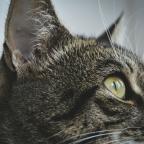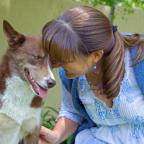
PDSA Weekly Q&A - 9 September 2024
Dear PDSA, my youngest of three cats, Hugo, is incredibly nervous around people he doesn't know – should I be concerned and is there anything I can do? Robbie
Some cats are naturally nervous around strangers, even when well socialised as kittens. Cats are very territorial, so they can become upset and worried when someone enters their space whether that be human or animal, but there are things you can do to help. Use pheromone plug-in diffusers around your home; these release a 'happy' hormone, so he should feel generally more relaxed as a starting point for any new, potentially worrying experiences. Providing 'high up' rest areas where he can survey his territory without feeling vulnerable, should also help, as will creating a safe space 'den' for him to hide in. Encourage visitors to leave him alone but have some treats to give him in case he feels confident enough to venture up to them. You can find more information about helping a nervous cat on our website, by searching "nervous cat" on our website: www.pdsa.org.uk/StressInCats
Dear PDSA, despite my German Shepherd having a hearty appetite, he's sicking up his food soon after eating. Do I need to see a vet? Michelle
Hi, Michelle, it's really important to have your dog checked by your vet, especially if this is a new problem. There are many possible reasons for vomiting soon after eating, which your vet will check him over for, such as a blockage in his guts or even an inherited condition that stops food moving down the food pipe, causing it to pool and be brought back up. Look out for any other signs of him feeling unwell and report these to your vet. However, if this is a one off or occasional occurrence it may be due to him being too eager when eating his meal, and he just needs to slow down. German Shepherd Dogs are a deep chested breed of dog, so are at higher risk of developing bloat, or gastric dilation volvulus (GDV) a life-threatening condition, which can be brought on by eating too fast, so this does need to be addressed. Removing the traditional food bowl altogether and introducing a puzzle or slow feeding bowl can help to slow his feeding right down, which is much safer. For more information visit: www.pdsa.org.uk/gdv-in-dogs
Dear PDSA, out of nowhere, my one-year-old Hamster has started doing acrobatics in her cage! Is this normal behaviour? Sheetal
Although hamsters doing acrobatics may look fun, new behaviours may develop because of illness, including neurological disorders, so it's important that your vet checks your hamster over in case of any underlying health issues. However, repetitive behaviours like this, and others including cage bar gnawing, can also develop if they don't have enough stimulation and feel frustrated. The accommodation that we provide can massively impacts how happy hamsters are in life. Hamsters traditionally have been expected to live in very small homes, but they need an enclosure that is at least 100cm x 50 cm and should have the opportunity to burrow, so will need a flooring base around 40cm deep. For more information on how to create the perfect home for your hamster visit: www.pdsa.org.uk/hamster-health
Dear PDSA, I'm looking into adopting a new, rescue cat. I already have another three-year-old female cat, what do you advise? Norma
Hi Norma, it's lovely to hear that you're looking to adopt another cat and you're thinking of your other pet's wellbeing. Cats are territorial and taking to another new cat can be challenging, most cats prefer not to share their home and so if you decide to adopt another cat, you will need to plan introductions carefully. Pheromone diffusers can be very helpful, plug some in around your home well before your new cat is due to arrive.
Introducing your cats must be taken slowly. Ideally, before your new cat moves in with you try scent swapping using each other's toys or blankets. Once you adopt your new cat, keep them separate at first, but allow them to see each other from another room, before allowing them to introduce themselves at their own pace. It's important to provide one litter tray, scratch post, bowl and bed per cat plus one extra. Spread them out around the house to give your cats space, so they can avoid each other, which they are likely to want to do, certainly at first. For more information visit: www.pdsa.org.uk/help-pets-adapt
For more information visit pdsa.org.uk
PDSA is the UK's largest vet charity providing a vital service for pets across the UK whose owners struggle to afford treatment costs for their sick and injured pets. For many vulnerable pets, PDSA is there to help when there is nowhere else for their owners to turn. Support from players of People's Postcode Lottery helps us reach even more pet owners with vital advice and information.







